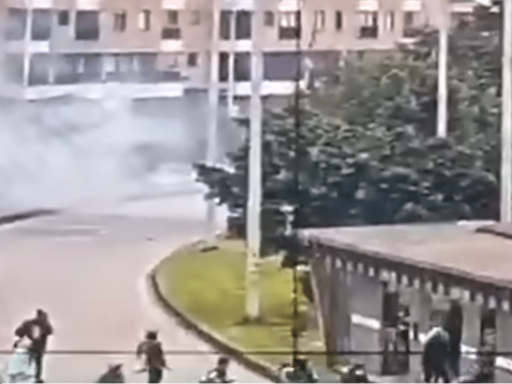On Friday 18 October, protestors in Bogota, Colombia clashed with anti-riot police outside the US embassy. Officials reported that the demonstrators used bows and arrows, along with explosives, injuring four officers.
The violence followed a week of action by the social movement People’s Congress (Congreso de los Pueblos). They were rallying against US president Donald Trump’s military aggression towards South American nations.
However, the protests ostensibly ended before the attack with the ratification of a new law enshrining the right to peaceful protest.
Colombian protestors ‘didn’t come to negotiate’
Friday’s running street battles forced the closure of Avenida 26, one of Bogota’s main roads, along with the nearby airport. Police in riot gear fired tear gas at the assembled crowds.
The protestors used wooden bows and bamboo arrows, of a kind used by indigenous Colombians to hunt deer. They also launched small explosive projectiles called ‘potato bombs’. Reports indicate that any injuries caused were minor.
Several Colombian politicians reacted by denouncing the violence and calling to arrest the protestors. Interior minister Armando Benedetti said:
They didn’t come to negotiate, they came to heat things up. That’s not what someone who wants to negotiate does. It’s clear that criminal structures are involved.
However, media outlets like the Bogota Post linked the armed protestors to the People’s Congress (Congreso de los Pueblos). The People’s Congress is a left-wing social and political movement dedicated to achieving social justice and a dignified life for the people of Colombia.
The People’s Congress has previously spoken out against Trump’s military aggression towards South American nations, particularly Venezuela. Trump has branded drug cartels as terrorists, and used this as justification for direct military intervention in Latin America.
US interventions in Venezuela
In August, the group called on Colombian president, Gustavo Petro, to break military relations with the US and avoid complicity in the military attacks on Venezuelan citizens. They posted:
With this order to use force against foreign cartels, Trump resumes the old policy of military intervention and interference under the pretext of the war on drugs since 1999 with the so-called “Plan Colombia” and his successors. The U.S. through the DEA is primarily responsible for the power of cartels, and U.S. foreign policy is primarily responsible for wars in the world.
200 years after the Monroe Doctrine, threats, military interventions and economic warfare seek to reaffirm their dominance in their “backyard.” 80 years after the hateful crime of Nagasaki and Hiroshima, we cannot forget that the United States continues to unleash its violence in the world with economic and military war, Palestine, Iran, Guam, or those who are in its path. […]
We welcome the strong statements of Colombian President Gustavo Petro and invite him to recognize the Maduro government, break military relations with the United States, not allow more military actions in the national territory and leave the agreements with NATO, thus avoiding at all costs that Colombia is complicit in a military and genocidal attack against the sister Republic of Venezuela.
The group had staged anti-imperialist protests, occupations of government buildings and blockades around the city throughout the week. Notably, it had arranged a demonstration outside the US embassy for Friday. However, none of the protests had shown signs of violence until Friday.
A spokesperson for the People’s Congress told Agence France-Presse:
We are demonstrating for our sovereignty, no more interference from the United States, against everything the United States has been involved in the genocide of Palestinians, its interference in Latin America, and the threats it has been making in the Caribbean… against the Venezuelan Bolivar mode.
Here in the struggle, we transform
Colombian president Gustavo Petro suggested that the armed group and the People’s Congress were not one and the same:
I ordered the utmost care with the US embassy in Bogotá. Unfortunately, after reaching an agreement … to lift the blockades, a more radical group attacked the police guarding the embassy, wounding several young people with arrows.
For its part, the People’s Congress expressed agreement with Petro’s assessment. However, they also took the opportunity to call on the president to build a united anti-imperialist front.
The agreement Petro referred to is called the Aquí en la lucha, transformamos (Here in the Struggle, We Transform) initiative. Struck in accord with the People’s Congress before the attack at the embassy, it recognises peaceful social protest as a human right protected by the Colombian constitution. As such, it details a government commitment to:
respect social mobilization, avoid its stigmatization and promote scenarios of cooperation that allow real solutions to citizen demands.
The Deputy Minister for Social Dialogue and Human Rights, H. Gabriel Rondón Olave, stated that:
Unlike other governments, we address social mobilization with dialogue and cooperation, not violence or stigmatization.
Likewise, Colombian human rights body Defensoría del Pueblo (Defence of the People) welcomed the initiative:
We celebrate the signing of the agreement between the National Government and the spokespersons of the Congress of the Peoples and of the “Here in the Struggle We Transform” initiative, as a demonstration of the value of social dialogue and consensus-building as a path to overcome conflicts and advance in guaranteeing rights.[…]
We recognize the commitment of the parties in assuming concrete agreements that include the establishment of working groups, the creation of an inter-institutional follow-up commission, and the guarantee of the right to protest and participation. Likewise, the decision of the protesters to begin unblocking the roads and the peaceful handover of occupied facilities is positive. This is the capacity for understanding and responsibility toward the country.
Questions remain regarding the consequences that the armed protestors may face. Reports indicate that they retreated to the National University Campus, which is usually off-limits to state forces. Some 2,000 members of indigenous and campesino groups have been camping out in the area since 13 October, using it as a staging ground for the recent protests.
Featured image via YouTube screenshot/Forbes Breaking News
From Canary via this RSS feed


